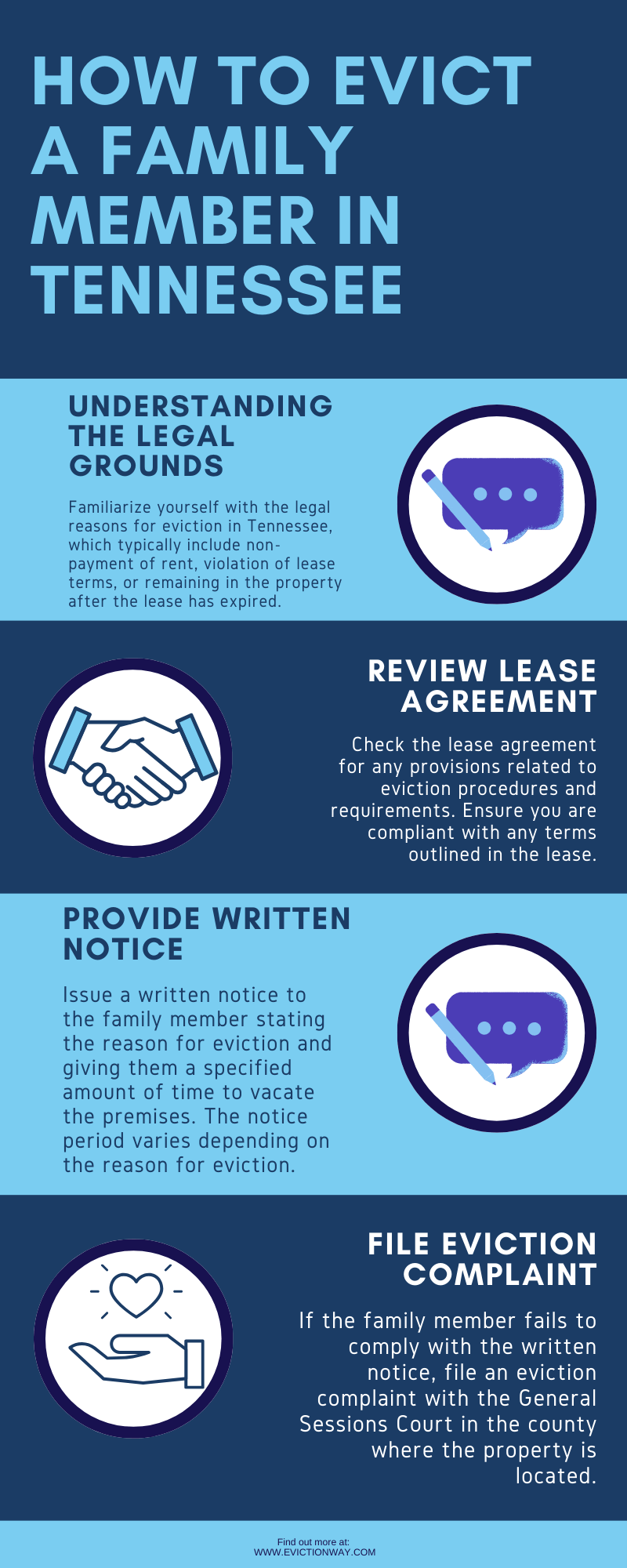Are you facing the difficult situation of needing to evict a family member in Tennessee? If so, you’re not alone. Many people find themselves in this position, and it can be a complex and emotional process. In this article, we’ll guide you through the steps involved in evicting a family member in Tennessee, including the legal requirements and tips for doing so respectfully.
First, it’s important to understand the legal process for evicting a family member in Tennessee. The specific steps may vary depending on your individual circumstances, but generally, you’ll need to provide your family member with a written notice to vacate the property.

This notice must include the date by which they must leave and the reason for the eviction. If your family member does not vacate the property by the deadline, you may need to file a formal eviction lawsuit with the court.
You should also try to be understanding of their situation and offer them assistance in finding alternative housing if possible. By following these tips, you can increase the chances of a successful and respectful eviction.
How To Evict a Family Member In Tennessee
Evicting a family member can be a difficult and emotional process, but it is sometimes necessary to protect your rights and property. If you are considering evicting a family member in Tennessee, it is important to understand the legal process and your rights as a landlord.
1. Give Proper Notice
The first step in evicting a family member is to give them proper notice. In Tennessee, you must give at least 30 days’ written notice to vacate the property. The notice must be delivered in person or by certified mail, and it must state the reason for the eviction.
2. File a Complaint with the Court
If your family member does not vacate the property after receiving the notice, you will need to file a complaint with the court. The complaint should state the facts of the case and the relief you are seeking, such as an order of eviction.

3. Serve the Complaint and Summons
Once you have filed the complaint, you will need to serve the complaint and summons on your family member. This can be done by the sheriff or by a private process server.
4. Attend the Hearing
After the complaint and summons have been served, a hearing will be scheduled. At the hearing, you will have the opportunity to present your case to the judge. Your family member will also have the opportunity to present their case.
5. The Judge’s Decision
After hearing both sides of the case, the judge will make a decision. If the judge finds in your favor, they will issue an order of eviction. This order will give your family member a specific amount of time to vacate the property.
6. Enforcing the Order of Eviction
If your family member does not vacate the property after the order of eviction has been issued, you can have the sheriff enforce the order. The sheriff will remove your family member from the property and lock it up.

Additional Resources for Tennessee eviction help:
30 days eviction notice Tennessee
In Tennessee, a 30-days eviction notice indeed serves as a legal document that landlords can utilize when tenants breach their lease agreements.
This notice essentially notifies tenants that they have thirty days to rectify the violation or vacate the premises. It’s a crucial step in the eviction process and provides tenants with a final opportunity to resolve the issue before further legal action is taken.
You can download 30 days eviction notice Tennessee here.
How Much Does it Cost to Evict a Family Member in Tennessee?
Evicting a family member can be a difficult and expensive process. The cost of eviction will vary depending on the specific circumstances of the case, but there are some general costs that you can expect to incur.
| Description | Approximate Cost (USD) |
|---|---|
| Filing Fee (Forcible Entry and Detainer) | $110 – $150 (varies by county) |
| Service of Process | $20 – $75 per defendant |
| Attorney’s Fees | $400 – $5,000+ (varies greatly) |
| Sheriff’s Eviction Fee | $100 – $200 |
| Possession Bond (if required) | Varies |
- Filing fees: The first step in the eviction process is to file a complaint with the court. The filing fee for an eviction complaint in Tennessee is $110.
- Service of process: Once the complaint has been filed, it must be served on the tenant. The cost of service of process will vary depending on the method of service.
- Attorney fees: If you hire an attorney to represent you in the eviction process, you will be responsible for paying their fees. Attorney fees can vary widely, so it is important to get a quote from an attorney before hiring them.
FAQs: Evicting a Family Member in Tennessee
Here are some of the most asked questions.
What are the grounds for evicting a family member in Tennessee?
In Tennessee, you can evict a family member for the same reasons you would evict any other tenant. These include nonpayment of rent, violating the lease agreement, or causing damage to the property.
How do I start the eviction process?
To start the eviction process, you must give your family member a written notice to vacate. This notice must state the reason for the eviction and the date by which they must leave. If your family member does not vacate by the deadline, you can file a complaint with the court.
What happens if my family member refuses to leave?
If your family member refuses to leave after you have filed a complaint with the court, the court will issue an order of eviction. This order will give your family member a specific amount of time to leave the property. If they do not leave by the deadline, the sheriff will forcibly remove them.

Can I evict a family member if they are not on the lease?
Yes, you can evict a family member even if they are not on the lease. However, you will need to prove that they are a tenant. You can do this by showing that they have been living in the property for a period of time, that they have been paying rent, or that they have been using the property as their primary residence.
What are some tips for evicting a family member?
Here are some tips for evicting a family member:
- Document everything: Keep a record of all communications with your family member, including any notices to vacate and court filings.
- Be prepared to go to court: If your family member does not vacate by the deadline, you will need to file a complaint with the court.
- Be patient: The eviction process can take time. Do not get discouraged if your family member does not leave immediately.
- Seek professional help: If you are having difficulty evicting your family member, you may want to seek professional help from an attorney or a housing counselor.
Related:
